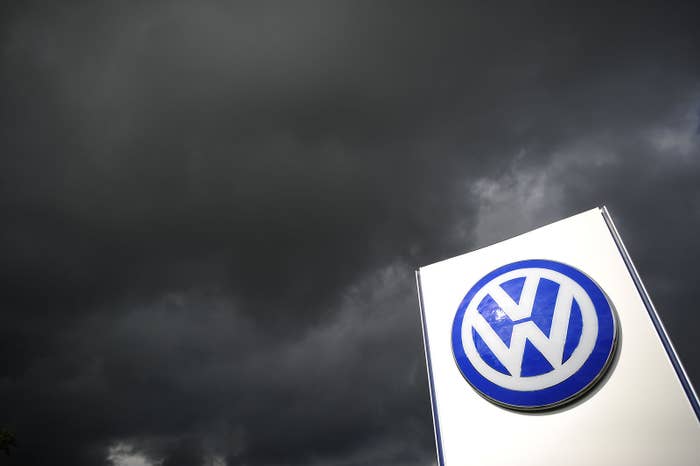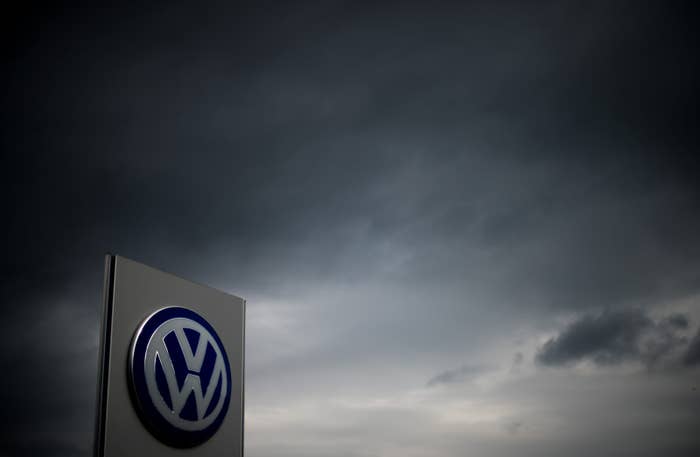
Volkswagen on Tuesday announced that an internal review has found "unexplained inconsistencies" in the carbon dioxide emissions for around 800,000 vehicles.
The finding could turn into a $2.2-billion crisis, the automaker warned.
The internal review was prompted after U.S. environmental officials announced in September that they had discovered VW diesel vehicles fitted with software designed to cheat federal emissions tests.
The Environmental Protection Agency on Monday issued a second notice of violation of clean air laws against VW, alleging the German automaker installed the "defeat devices" in many more vehicles than initially thought.
In September, VW promised a "comprehensive investigation" into the matter, the first results of which were released Tuesday.
"During the course of internal investigations unexplained inconsistencies were found when determining Type Approval CO2 levels," VW said in a statement on its website. "Based on present knowledge around 800,000 vehicles from the Volkswagen Group are affected."
"We wish to reiterate that the safety of these vehicles is in no way compromised," the statement added. "A reliable assessment of the scale of these irregularities is not yet possible. An initial estimate puts the economic risks at approximately two billion euros [or almost $2.2 billion]."
The VW board will immediately begin a "dialogue" with regulators, the company said.
"The Board of Management of Volkswagen AG deeply regrets this situation and wishes to underscore its determination to systematically continue along the present path of clarification and transparency," the statement continued.
A German-language statement also included a quote from CEO Matthias Müller: "I've said from the start that we will clarify what happened tirelessly and completely. We'll stop at nothing. This is a painful process, but there is no alternative for us. What counts for us is solely the truth. This is a necessary step for the fundamental shift Volkswagen needs."

Diesel vehicles with models years between 2014 and 2016 made by Volkswagen, as well as its subsidiary companies Audi and Porsche, have been found to contain the "defeat device," which kicks in during emissions tests before returning to a standard mode that increases emissions of nitrogen oxide up to nine times the EPA’s standard.
Cars covered under the latest notice of violation include the diesel versions of the 2014 VW Touareg, the 2015 Porsche Cayenne, and the 2016 Audi A6 Quattro, A7 Quattro, A8, A8L, and Q5.
Some 10,000 of the cars have already been sold in the United States, according to the EPA, which also says the notice covers an "unknown volume" of cars with 2016 model years.
In a call to reporters, Cynthia Giles, assistant administrator for the office for EPA’s enforcement and compliance assurance, said the German automaker had "failed its obligation to comply with the law that protects clean air for all Americans."
“All companies should be playing by the same rules," she said.
The second notice of violation comes after the company was shamed worldwide when U.S. environmental officials first announced they had discovered the cheating software
Former Volkswagen CEO Martin Winterkorn resigned after the news came to light, but maintained he knew nothing of the software. German prosecutors have since opened an investigation into Winterkorn for fraud.
Officials stressed that owners of the vehicles in question are presently required to take no action and that their cars are still safe and legal to drive.
A possible recall would be ordered only after the EPA reviews any proposals offered by Volkswagen on how to fix the cars so they comply with the law, officials said.
The EPA and the California Air Resources Board (CARB) have both initiated investigations based on VW's alleged actions.
"This is a very serious public health matter," CARB Executive Officer Richard Corey told reporters. "[CARB] and EPA will continue to conduct a rigorous investigation that includes testing more vehicles until all of the facts are out in the open."
